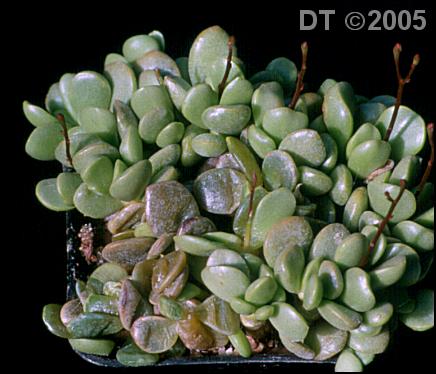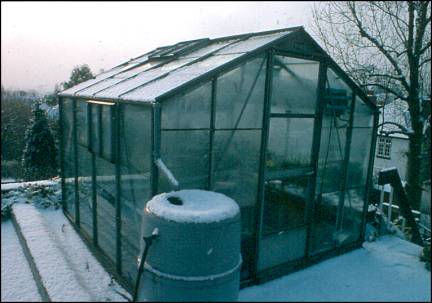| FREQUENTLY
ASKED QUESTIONS 11. Are they
susceptible to pests and diseases?
Pests also love
these plants! Most insects that trouble
pot-plants can damage Adro's. Also, beware of
green/black/whitefly upon inflorescences in
summer. A systemic insecticide used as a soil
drench in the warmer months should control pests
e.g. imidacloprid, dimethoate. For more advise
about treating pest and diseases of succulents,
see The Cactus Mall or The Succulent Plant Page(s).
Western Flower
Thrips have become a widespread problem in UK
glasshouses in recent years. They are so mobile
that it is very difficult to eradicate them. I
position both yellow and blue sticky strip
sections low down among my plants, positioned
vertically. These make a dangerous environment
for pests.

Soft rot (Botrytis?) rapidly reducing A. nanus
from Smorenskadu farm, Bushmanland to mush in winter. The only cure is to remove every trace of soft flesh
and keep the remnants in a warm atmosphere to dry out e.g. indoors on a
radiator.Now more bad news!
The smaller species of sections 2, 3 (A.
nanus)
& 5 are particularly prone to fungal
problems. As winter approaches in the UK in
November, when days are damp and gloomy,
deciduous trees drop their leaves. As these start
to rot, the air is full of fungal spores. Any
dead leaves or flower spikes remaining on your
Adromischus plants may also become mouldy. Drops
of nectar from the flowers in summer also start
going mouldy at this time of year. I have seen
rot travel down a flower spike and into the main
stem of an Adromischus within two to three days.

Brrr! An Adromischus greenhouse in a UK winter.
Alas this sun-trap upon a garage roof was
demolished several years ago.
As ever,
prevention is better than cure. I water Adro's
from sections 2, 3 (A. nanus) & 5 with a systemic
fungicide every year in the early autumn (fall).
Remove all flower spikes (even if unfinished) on
susceptible species by mid-autumn. In addition,
dispose of all dead leaves from your Adro's by
this time of year. Good hygiene is essential.
Positioning air
circulation fans to blow across your plants (e.g.
computer ventilation fans) can also reduce the
risk of rotting. These fans can also prevent
scorching in summer. From bitter experience,
never break leaves off A.
marianiae (especially "hallii") in winter or the whole
plant may be lost!
|